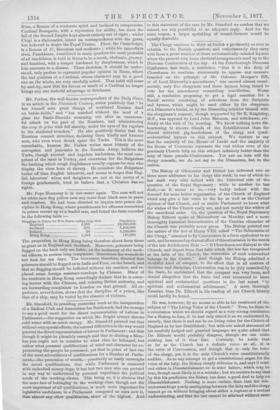The Clergy continuo to show as foolish a pertinacity as
ever in relation to the Burials question, and unfortunately they carry with them a great number of those ecclesiastically-minded laymen whom the present very loose electoral arrangements send up to the Diocesan Conferences of the day. At the Peterborough Diocesan Conference last week, a resolution "that it is the duty of Churchmen to continue strenuously to oppose any measure founded on the principle of Mr. Osborne 1Vlorge.n's Bill, or of Lord Harrowby's amendment," was carried almost unani- mously, only five clergymen and three laymen being found to- vote for the amendment counselling conciliation. Worse still, a resolution proposing to get a legal sanction for a Burial service consisting of selections from the Scripture and hymns, which might be used either by the clergyman at a Dissenter's burial, or by the Dissenting minister himself with the clergyman's consent, though supported by Sir R. Knightley, M.P., was opposed by Lord John Manners, and withdrawn, evi- dently at the wish of the meeting. We know nothing more dis- heartening to sincere friends of the Establishment than the almost universal pig-headednesa of the clergy and quasi- ecclesiastical laymen on this subject. We venture to say that the majority of the House of Lords and the majority of the House of Commons represent the real wishes even of the genuinely Church laity on this subject infinitely better than the laity of these pseudo-Conferences. Yet not an iota will the clergy concede, we do not say to the Dissenters, but to the nation.


































 Previous page
Previous page